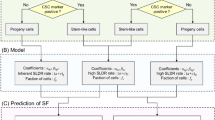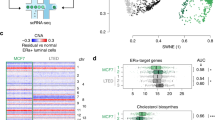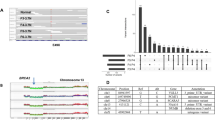Abstract
A growing body of evidence attributes properties of chemo- and/or radiation-resistance to cancer stem cells (CSCs). Moreover, non-targeted delayed effects such as genomic instability, transmitted through many generations, can be observed in the progeny of surviving irradiated cells. As a consequence, we propose that radiation-resistance properties associated to CSCs could confer a key role to this subpopulation in the transmission of genomic instability. To test this hypothesis, we searched the CSC markers associated to radiation-resistance in breast cancer cell lines and studied the role of the resistant cells in the transmission of genomic instability. First, we show that irradiation induces a 2–4 weeks period of intense cell death leading to the emergence of chromosomal unstable cells during more than 35 population doublings. Then, among seven breast CSC markers, we identify CD24−/low labelling as a marker of radiation-resistance. We demonstrate that CD24+ progeny of irradiated cells exclusively descends from CD24−/low cells. Finally, we show that delayed chromosomal instability is only expressed by CD24+ cells, but is transmitted by stable surviving CD24−/low cells. So, for the first time a CSC marker, CD24, is associated with the transmission of genomic instability. This work may assign a new deleterious role to breast CSCs in aggressive recurrence after radiotherapy, as the transmitted genomic instability potentially leads tumour cells to acquire more aggressive characteristics.
This is a preview of subscription content, access via your institution
Access options
Subscribe to this journal
Receive 50 print issues and online access
$259.00 per year
only $5.18 per issue
Buy this article
- Purchase on Springer Link
- Instant access to full article PDF
Prices may be subject to local taxes which are calculated during checkout





Similar content being viewed by others
References
Little JB . Radiation-induced genomic instability. Int J Radiat Biol 1998; 74: 663–671.
Morgan WF, Day JP, Kaplan MI, McGhee EM, Limoli CL . Genomic instability induced by ionizing radiation. Radiat Res 1996; 146: 247–258.
Mothersill C, Seymour CB . Mechanisms and implications of genomic instability and other delayed effects of ionizing radiation exposure. Mutagenesis 1998; 13: 421–426.
Ponnaiya B, Cornforth MN, Ullrich RL . Induction of chromosomal instability in human mammary cells by neutrons and gamma rays. Radiat Res 1997; 147: 288–294.
Sudo H, Garbe J, Stampfer MR, Barcellos-Hoff MH, Kronenberg A . Karyotypic instability and centrosome aberrations in the progeny of finite life-span human mammary epithelial cells exposed to sparsely or densely ionizing radiation. Radiat Res 2008; 170: 23–32.
Suzuki K, Ojima M, Kodama S, Watanabe M . Delayed activation of DNA damage checkpoint and radiation-induced genomic instability. Mutat Res 2006; 597: 73–77.
Rosen JM, Jordan CT . The increasing complexity of the cancer stem cell paradigm. Science 2009; 324: 1670–1673.
Kai K, Arima Y, Kamiya T, Saya H . Breast cancer stem cells. Breast Cancer 2010; 17: 80–85.
Al-Hajj M, Wicha MS, Benito-Hernandez A, Morrison SJ, Clarke MF . Prospective identification of tumorigenic breast cancer cells. Proc Natl Acad Sci USA 2003; 100: 3983–3988.
Sheridan C, Kishimoto H, Fuchs RK, Mehrotra S, Bhat-Nakshatri P, Turner CH et al. CD44+/CD24− breast cancer cells exhibit enhanced invasive properties: an early step necessary for metastasis. Breast Cancer Res 2006; 8: R59.
Shipitsin M, Campbell LL, Argani P, Weremowicz S, Bloushtain-Qimron N, Yao J et al. Molecular definition of breast tumor heterogeneity. Cancer Cell 2007; 11: 259–273.
Hwang-Verslues WW, Kuo WH, Chang PH, Pan CC, Wang HH, Tsai ST et al. Multiple lineages of human breast cancer stem/progenitor cells identified by profiling with stem cell markers. PLoS One 2009; 4: e8377.
Resetkova E, Reis-Filho JS, Jain RK, Mehta R, Thorat MA, Nakshatri H et al. Prognostic impact of ALDH1 in breast cancer: a story of stem cells and tumor microenvironment. Breast Cancer Res Treat 2010; 123: 97–108.
Yu F, Yao H, Zhu P, Zhang X, Pan Q, Gong C et al. let-7 regulates self renewal and tumorigenicity of breast cancer cells. Cell 2007; 131: 1109–1123.
Fillmore CM, Kuperwasser C . Human breast cancer cell lines contain stem-like cells that self-renew, give rise to phenotypically diverse progeny and survive chemotherapy. Breast Cancer Res 2008; 10: R25.
Nguyen NP, Almeida FS, Chi A, Nguyen LM, Cohen D, Karlsson U et al. Molecular biology of breast cancer stem cells: potential clinical applications. Cancer Treat Rev 2010; 36: 485–491.
Pajonk F, Vlashi E, McBride WH . Radiation resistance of cancer stem cells: the 4 R’s of radiobiology revisited. Stem Cells 2010; 28: 639–648.
Diehn M, Cho RW, Lobo NA, Kalisky T, Dorie MJ, Kulp AN et al. Association of reactive oxygen species levels and radioresistance in cancer stem cells. Nature 2009; 458: 780–783.
Phillips TM, McBride WH, Pajonk F . The response of CD24(−/low)/CD44+ breast cancer-initiating cells to radiation. J Natl Cancer Inst 2006; 98: 1777–1785.
Lagadec C, Vlashi E, Della Donna L, Meng Y, Dekmezian C, Kim K et al. Survival, self-renewing capacity and multi-lineage potency of breast cancer initiating cells during fractionated radiation treatment. Breast Cancer Res 2010; 12: R13.
Luce A, Courtin A, Levalois C, Altmeyer-Morel S, Romeo PH, Chevillard S et al. Death receptor pathways mediate targeted and non-targeted effects of ionizing radiations in breast cancer cells. Carcinogenesis 2009; 30: 432–439.
Gewirtz DA . Growth arrest and cell death in the breast tumor cell in response to ionizing radiation and chemotherapeutic agents which induce DNA damage. Breast Cancer Res Treat 2000; 62: 223–235.
Gewirtz DA, Sundaram S, Magnet KJ . Influence of topoisomerase II inhibitors and ionizing radiation on growth arrest and cell death pathways in the breast tumor cell. Cell Biochem Biophys 2000; 33: 19–31.
Olivier M, Bautista S, Valles H, Theillet C . Relaxed cell-cycle arrests and propagation of unrepaired chromosomal damage in cancer cell lines with wild-type p53. Mol Carcinog 1998; 23: 1–12.
Mani SA, Guo W, Liao MJ, Eaton EN, Ayyanan A, Zhou AY et al. The epithelial-mesenchymal transition generates cells with properties of stem cells. Cell 2008; 133: 704–715.
Ponti D, Costa A, Zaffaroni N, Pratesi G, Petrangolini G, Coradini D et al. Isolation and in vitro propagation of tumorigenic breast cancer cells with stem/progenitor cell properties. Cancer Res 2005; 65: 5506–5511.
Vlashi E, McBride WH, Pajonk F . Radiation responses of cancer stem cells. J Cell Biochem 2009; 108: 339–342.
Debeb BG, Xu W, Woodward WA . Radiation resistance of breast cancer stem cells: understanding the clinical framework. J Mammary Gland Biol Neoplasia 2009; 14: 11–17.
Abraham BK, Fritz P, McClellan M, Hauptvogel P, Athelogou M, Brauch H . Prevalence of CD44+/CD24−/low cells in breast cancer may not be associated with clinical outcome but may favor distant metastasis. Clin Cancer Res 2005; 11: 1154–1159.
Giatromanolaki A, Sivridis E, Fiska A, Koukourakis MI . The CD44+/CD24− phenotype relates to ‘triple-negative’ state and unfavorable prognosis in breast cancer patients. Med Oncol 2011; 28: 745–752.
Baumann P, Cremers N, Kroese F, Orend G, Chiquet-Ehrismann R, Uede T et al. CD24 expression causes the acquisition of multiple cellular properties associated with tumor growth and metastasis. Cancer Res 2005; 65: 10783–10793.
Bircan S, Kapucuoglu N, Baspinar S, Inan G, Candir O . CD24 expression in ductal carcinoma in situ and invasive ductal carcinoma of breast: an immunohistochemistry-based pilot study. Pathol Res Pract 2006; 202: 569–576.
Kristiansen G, Winzer KJ, Mayordomo E, Bellach J, Schluns K, Denkert C et al. CD24 expression is a new prognostic marker in breast cancer. Clin Cancer Res 2003; 9: 4906–4913.
Aypar U, Morgan WF, Baulch JE . Radiation-induced genomic instability: are epigenetic mechanisms the missing link? Int J Radiat Biol 2011; 87: 179–191.
Aypar U, Morgan WF, Baulch JE . Radiation-induced epigenetic alterations after low and high LET irradiations. Mutat Res 2011; 707: 24–33.
Lahtz C, Pfeifer GP . Epigenetic changes of DNA repair genes in cancer. J Mol Cell Biol 2011; 3: 51–58.
Bloushtain-Qimron N, Yao J, Snyder EL, Shipitsin M, Campbell LL, Mani SA et al. Cell type-specific DNA methylation patterns in the human breast. Proc Natl Acad Sci USA 2008; 105: 14076–14081.
Hernandez-Vargas H, Ouzounova M, Le Calvez-Kelm F, Lambert MP, McKay-Chopin S, Tavtigian SV et al. Methylome analysis reveals Jak-STAT pathway deregulation in putative breast cancer stem cells. Epigenetics 2011; 6: 428–439.
Rossi L, Challen GA, Sirin O, Lin KK, Goodell MA . Hematopoietic Stem Cell Characterization and Isolation. Methods Mol Biol 2011; 750: 47–59.
Acknowledgements
We thank Dr P-H. Romeo for constructive criticism on this manuscript. We also thank Drs J Baijer, D Lewandowski and P Fouchet for flow cytometry technical assistance and advices. This work was supported by grants from Electricité de France (EDF) and from MELODI and DoReMi Networks.
Author information
Authors and Affiliations
Corresponding author
Ethics declarations
Competing interests
The authors declare no conflict of interest.
Additional information
Supplementary Information accompanies the paper on the Oncogene website
Rights and permissions
About this article
Cite this article
Bensimon, J., Altmeyer-Morel, S., Benjelloun, H. et al. CD24−/low stem-like breast cancer marker defines the radiation-resistant cells involved in memorization and transmission of radiation-induced genomic instability. Oncogene 32, 251–258 (2013). https://doi.org/10.1038/onc.2012.31
Received:
Revised:
Accepted:
Published:
Issue Date:
DOI: https://doi.org/10.1038/onc.2012.31
Keywords
This article is cited by
-
The Role of Steroid Hormones in Breast and Effects on Cancer Stem Cells
Current Stem Cell Reports (2018)
-
Breast cancer stem cell: the roles and therapeutic implications
Cellular and Molecular Life Sciences (2017)



